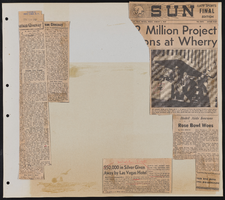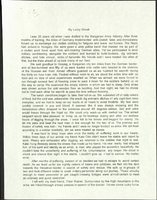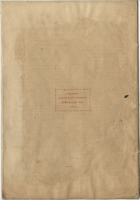Search the Special Collections and Archives Portal
Search Results

Transcript of interview with Henry Kronberg by Barbara Tabach, February 26, 2015 and April 13, 2015
Date
Archival Collection
Description
Interview with Henry Kronberg by Barbara Tabach in two sessions, February 26 and April 13, 2015. In the first session Kronberg talks about his childhood in Germany and Poland and his experience being imprisoned by the Gestapo, and transported to a concentration camp. He survived the Holocaust and met his wife, and they moved to the United States in 1946. He discusses being reunited with his sister in Las Vegas after decades of searching, and moved his family to Las Vegas in 1962. Kronberg talks about becoming involved with Jewish life here, and his wife, Lillian's involvement at Temple Beth Sholom. In the second session, Kronberg discusses purchasing Stoney's, a loan and pawn shop, including some of the clientele and merchandise. He also discusses other social and environmental concerns like anti-Semitism and water resources in Southern Nevada.
Henry Kronberg was born in 1920 and spent his early childhood in a town on the border of Poland and Germany, about 40 miles from Krakow. For years he felt uncomfortable telling his story of surviving the Nazi concentration camps of World War II. Today his name is linked to the Sperling Kronberg Mack Holocaust Resource Center in Las Vegas. And in his soft-spoken manner, Henry recalls his ordeal of loss of family and survival during this most heinous of situations through backbreaking labor and ingenuity. At the end of the war, Henry met the love of his life, Lillian, also a survivor. The two married in 1946 in Frankfurt and immigrated to New Jersey where she had relatives. He describes their difficulties and the various jobs he held until becoming an excellent baker. Then in 1962 an interesting choice took him to a bar mitzvah in Canada. While there the dinner conversation lead him to a great discovery?his sister Lala had survived and was living in Las Vegas. Soon he moved his wife and daughter to Las Vegas. His first foray into business was with his brother-in-law. However, soon it was important to be independent and to control his own destiny. He purchased a going concern, Stoney's Pawn Shop, from Dr. Alexander Coblentz, one of the city's first doctors. He became the fourth owner of Stoney's and operated it until selling it to Steven Mack in 1998. Henry and his wife were active in the Jewish community. They joined Temple Beth Sholom and became fast friends with many of the early leaders of Las Vegas and became a respected member of the secular and Jewish communities.
Text
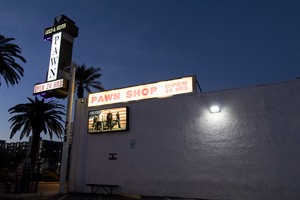
Photographs of Gold and Silver Pawn Shop signs, Las Vegas (Nev.), March 3, 2017
Date
Archival Collection
Description
Site address: 713 S Las Vegas Blvd
Sign owner: Richard Harrison
Sign details: This pawn shop was opened by Richard Harrison in 1988. Rick , Richard and Corey Harrison along with Austin Russell made this store famous with the History Channel reality T.V. show Pawn Stars which started airing in 2009. This show has made this location a tourist destination, so much so there is even a line to get in sometimes. With the rise of popularity they added Rick Harrison's Pawn Plaza which is a shopping center with eateries.
Sign condition: 4- looks relatively new and not too faded
Sign form: Rectangular Blade
Sign-specific description: The whole blade sign is outlined with a gold trim and red LED lights surrounding the gold. The main long rectangle blade spells out "PAWN" lengthwise in black on white backdrop. Right above the white part of the blade is a black rectangle (long side of rectangle is above the white blade) stating "Gold & Silver" written in white thin printed letters. Above this is a little white diamond. Below the white PAWN blade is a white rectangle stating "OPEN 24 HRS" in red block print letters. This blade-type sign is held right next to the building on a big white beam that has their address "713" painted on it. On the building above the entrance states "World Famous (in yellow) Gold and Silver (In red) Pawn Shop ( in Green) in back lit plastic letters. Also to the left of the entrance they have 3 plastic rectangle back lit signs that they have switched out over the years, but the current ones have been up since 2011/12. The one in the middle states "World Famous Gold & Silver Pawn Shop" in an elaborate white cursive font written on a black background. The other two showcase the Welcome to Fabulous Las Vegas Logo but states "World Famous Gold & Silver Las Vegas" . Below these three rectangle signs there is another smaller one with a white background stating "We Never Close" in thick blue type font letters.
Sign - type of display: Back lit plastic signs, LED lights
Sign - media: Steel, Plastic
Sign - non-neon treatments: Back lit plastic
Sign animation: Charger with red LED's
Sign environment: Halfway between the strip and downtown on Las Vegas Blvd. There are a few antique shops near the pawn shop. Right next door is now Rick Harrison's Pawn Plaza Shopping Center as well as a nice sized parking lot to accommodate their guests.
Sign - date of installation: Has been up since at least 2007
Sign - date of redesign/move: Some of the plastic back lit signs have been switched out over the years
Sign - thematic influences: Gold+ Silver- could refer to the mining times in Nevada and since it is a pawn shop it could mean that you can strike it rich with bringing something there. Similar to finding gold or silver.
Sign - artistic significance: The blade type sign was popular in the 50's for directions in the car consumer and traveling era.
Survey - research locations: Acessor's page, Nevada Magazine http://nevadamagazine.com/home/inside-the-magazine/city-limits/gold-silver-pawn-shop/ , Gold and Silver Pawn Shop website https://gspawn.com/ , history.com for information on the show
Surveyor: Emily Fellmer
Survey - date completed: 2017-08-12
Sign keywords: Backlit; Plastic; LED; Steel; Pole sign
Mixed Content
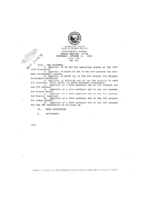
Meeting minutes for Consolidated Student Senate University of Nevada, Las Vegas, October 11, 1990
Date
Archival Collection
Description
Text
Urban Chamber of Commerce of Las Vegas, Nevada Records
Identifier
Abstract
The Urban Chamber of Commerce of Las Vegas, Nevada Records date from approximately 1980 to 2009 and contains the organizational records of the Urban Chamber of Commerce of Las Vegas, Nevada (UCC), one of the many chambers of commerce in the Las Vegas, Nevada area. The mission of the Urban Chamber of Commerce is to create and foster an environment that promotes development of members and Black-owned businesses. The collection is comprised of publications, financial and administrative records, various event information, and photographs of events and membership.
Archival Collection
Equal Rights Nevada Collection
Identifier
Abstract
The Equal Rights Nevada (2000-2002) collection is comprised of organizational records documenting the group’s unsuccessful fight against Question 2, a referendum voted upon in 2000 and 2002 to amend Nevada’s state constitution to forbid same-sex marriage. It includes campaign files, financial records, publicity, correspondence, ephemera, and other supporting documentation from national and regional marriage equality organizations.
Archival Collection

